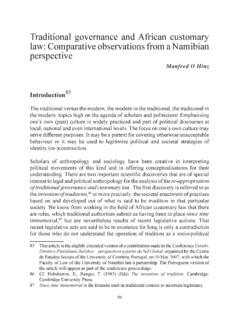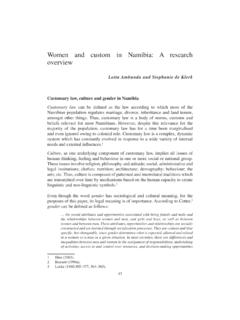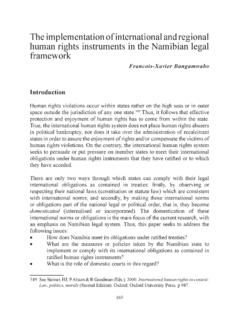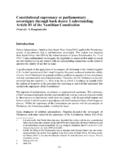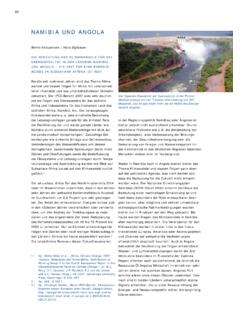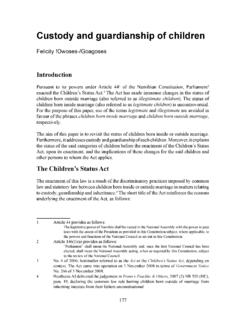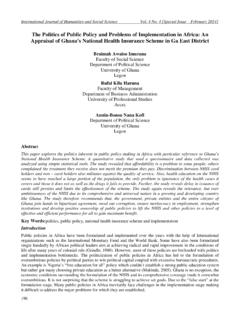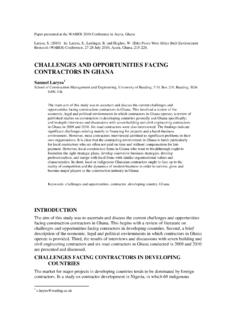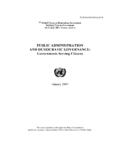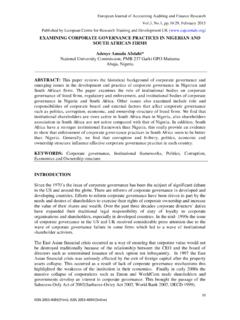Transcription of Politics of Identity and Exclusion in Africa: From …
1 Politics of Identity and Exclusion inAfrica: From violent confrontation to peaceful Cooperation25 26 July 2001 Senate HallUniversity of PretoriaIntroduction5 Prof. Hussein Solomon, Head: Unit for African Studies, Centre for International Political Studies, University of PretoriaWelcoming Remarks7Dr Michael Lange, Resident Representative, Konrad Adenauer FoundationOpening Address11Mr Welile Nhlapo, Deputy Director-General, Department of Foreign Affairs, South AfricaExploring the Concept of Identity in World Politics13 Prof. Anton du Plessis, Department of Political Sciences, University of PretoriaReflections on the Roots of War27Dr John G. Hund, Senior Researcher, Institute of Foreign and Comparative Law, University of South Africa (Unisa)A Nigerian Case Study43Dr Charles Quaker-Dokubo, Research Fellow, Nigerian Institute of International AffairsTheocracy and State Reconstruction in the Civil War Ravaged Sudan: In Pursuit of 57an Illusive National ConsensusProf.
2 Korwa G. Adar, International Studies Unit, Rhodes UniversityTowards Finding a Solution for the Problems Created by the Politics of Identity 67in the Democratic Republic of the Congo (DRC): Designing a Constitutional Framework for peaceful CooperationProf. Jeremy Sarkin, Deputy Dean, Law Faculty, University of the Western CapeExclusion, Identity and Armed Conflict: A Historical Survey of the Politics of 81 confrontation in Uganda with Specific Reference to the Independence EraMr Paul Nantulya, Head, Constitutionalism Project, ACCORDT able of Contents3 Angola: A Case Study93 Prof. Gerald J. Bender, School of International Relations, University of Southern California, United StatesMozambique: A Case Study97 Prof. Andr Thomashausen, Director, Institute of Foreign and Comparative Law, UnisaThe Importance of Economic Development in Fostering Human Rights Practice in Africa113Mr Zingisile N. Jobodwana,Senior Researcher, Institute of Foreign and Comparative Law, Unisa; Director, Socio-Economic and Human Rights Research CentreThe Element of Tolerance in African Custom127 Prof.
3 Moyisi S. Majeke, PhD (Iowa), Department of Comparative Law, History of Law andJurisprudence, University of VendaTransforming Ethnic Conflicts137 Prof. Hussein Solomon, Head, Unit for African Studies, Centre for International Political Studies,University of Pretoria and Sally Matthews, University of PretoriaSummary of Proceedings and Closure155 Prof. Andr Thomashausen, Director, Institute of Foreign and Comparative Law, UnisaProgramme159 Participants List161 Seminar Reports167 Occasional Paper Series1694 Table of Contents Africa has no need for the criminals who would acquire political power by slaughtering theinnocents as do the butchers of the people of Richmond in KwaZulu-Natal. Nor has she need forsuch as those who, because they did no accept that power is legitimate only because it serves theinterests of the people, laid Somalia to waste and deprived its people of a country which gave itscitizens a sense of being as well as the being to build themselves into a people.
4 Neither hasAfrica need for petty gangsters who would be our governors by theft of elective positions, as aresult of holding fraudulent elections, or by purchasing positions of authority through briberyand corruption. The thieves and their accomplices, the givers of the bribes and the recipients areas Africa as you and I. We are the corruptor and the harlot who act together to demean our con-tinent and ourselves. The time has come that we say enough and no more, and by acting to ban-ish the shame, remake ourselves as the midwives of the African Renaissance. (South African President Thabo Mbeki, Gallagher Estate, 13 August 1998)From Angola in the south-west through the Congos to Sudan in the north-west, a conflict zone existswhich passes through the heart of Africa. Over the past four decades this has accounted for the death ofmillions, while contributing to the displacement of millions more.
5 More depressing is the fact that con-tagion has occurred and now affects areas in Southern Africa, North and East Africa and West of these conflicts are intrastate and their roots often lie in contested perceptions of ethno-reli-gious Identity . For this reason, the Unit of African Studies at the University of Pretoria and the Institute of Foreign andComparative Law at the University of South Africa, with the financial support of the Konrad AdenauerFoundation, decided to hold a conference entitled Politics of Identity and Exclusion in Africa: FromViolent confrontation to peaceful Cooperationat the University of Pretoria on 25 26 July aim of the conference was to understand the root causes of the Politics of Identity and Exclusion ,which has so scarred this beloved continent of Africa. The conference was further based on twocaveats. First, following on President Mbeki s statement (quoted above), Africans need to take respon-sibility for conflict prevention and reduction in their respective societies.
6 The fact that many of theseconflicts owe much of their origins to poor and ineffective governance, corruption, the ineffective useof the financial resources of the state and the abuse of human rights, underline this point. This wasemphasised by the Secretary-General of the Organisation of African Unity when he noted, [W]e canno longer fold our hands and wait for foreigners to come and resolve our problems. * Second, and aconcomitant of the first point is that there can be no African Renaissance, no New Africa Initiative, noAfrican Union if violence, conflict and war continue to be the bane of the ordinary African. 5 Introduction* Salim. 1994. The Frontline States: a new alliance for peace and development in Southern Africa. Paper present-ed to the Meeting of the Ministers of Defence and Security in the Frontline papers presented at the conference are contained in this publication.
7 By deepening our understand-ing of the origins and management of Identity -based conflicts, it is hoped that they will impact positive-ly on processes of conflict reduction and prevention on the conference programme was dedicated to a number of case studies (Sudan, Nigeria, Uganda, theDemocratic Republic of the Congo DRC, Angola and Mozambique), as well as analytical and theo-retical papers. The keynote for the theoretical papers was set by South African Deputy Director-General of Foreign Affairs, Ambassador Welile Nhlapo, when he revisited the end of history debate putforward by Francis Fukuyama. Ambassador Nhlapo challenged the idea that the triumph of liberal capi-talism represents a historical end-state arguing that it has many competitors, albeit fragmented this he includes various forms of religious fundamentalism as well as ethnic nationalism. The resur-gence of these forms of Identity especially in their virulent form is clearly a cause for concern.
8 It isprecisely for this reason, he argues, that such a conference is important in seeking to deepen our under-standing of conflict Solomon and Sally Matthews stated in the final paper read at the conference that while ethnicidentities can serve a useful function in providing people with a sense of security and ethnic identifica-tion, it can also lead to violent conflict and terrible destruction. They examined how ethnic identitiescan be pushed on to a more peaceful trajectory by a combination of internal conflict managementstrategies aimed at addressing the question of nationhood and power-sharing, as well as external con-flict management strategies such as early warning and pointed out by Prof. Andr Thomashausen in his Conference Summary, the papers presented de-monstrate that: Identity and ethnicity are not static and are capable of evolving understanding our genetic propensity for aggressiveness and xenophobia can result in developing ourability to manage our social lives peacefully in the six great crisis zones on the African continent, first in Nigeria, the quest is for balancing cultur-al and religious and resources diversity; second, in the Sudan, the challenge is to redesign the rules ofthat nation so as to bring them in line with the actual sense of Identity of the majority, with adequateinclusion of minorities; third, in the DRC, the absence of any constitutional model and legitimateprocedures is the actual root of the conflict which has been provoked by artificial Politics of exclu-sion ( divide and rule ).
9 Fourth, that in Uganda the multiplicity of conflict layers requires the defini-tion of a model that encompasses a culture of integration and accommodation; fifth, in Angola, twoworlds exist and fight to eliminate the other, in the absence of effective mechanisms that couldrestore territorial and national unity; and finally, that in Mozambique lasting peace was achievedthrough shifts in perceived political and ideological identities, encouraged by effective Hussein SolomonHead: Unit for African Studies, Centre for International Political StudiesUniversity of Pretoria6 IntroductionINTRODUCTIONOn behalf of the Konrad Adenauer Foundation(KAF), I would like to extend a very warmwelcome to you is the first time KAF has participated inthe preparation of an international conferencewith the University of Pretoria s Unit ofAfrican Studies at the Centre for InternationalPolitical Studies and the Institute of Foreignand Comparative Law of the same university.
10 We believe that by continuing our efforts tocontribute in a meaningful way towards theresolution of conflict in Africa, we shall suc-ceed in promoting an even greater understand-ing of the challenges of peace building andpeace keeping in Africa. We believe that issuesof peace building and peace keeping are asmuch a concern to civil society and organisa-tions such as KAF, as outside observers, asthey should be to governments and practicallyeach and every citizen of this continent. By assisting in bringing about this confer-ence entitled Politics of Identity and Exclusionin Africa: From violent confrontation toPeaceful cooperation , we are continuing ourefforts, which started a few years ago with theorganisation of a series of similar conferenceson the issue of Managing Ethnic Conflict , incooperation with the Centre for ConflictResolution in Cape Town, which was alsoattended by participants from all over BACKGROUND TO KAFFor those of you wondering what KAF is, andwhy we have decided to sponsor this event,allow me to sketch a brief background to theGerman political foundations and to outlinesome of the reasoning behind the involvementof KAF in Africa.
